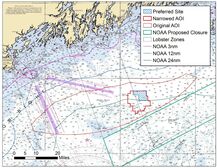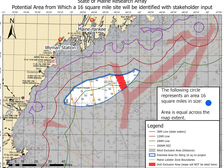New advisory group to study port development for offshore wind
 SCREENSHOT / COURTESY, MAINE DEPARTMENT OF TRANSPORTATION
The Maine Department of Transportation established an advisory group to study port development for offshore wind, as part of the state’s push to develop the industry. From left in this illustration, a spar foundation, semi-submersible and a tension platform are examples of floating wind turbine foundations. Maine is looking at semi-submersible foundations.
SCREENSHOT / COURTESY, MAINE DEPARTMENT OF TRANSPORTATION
The Maine Department of Transportation established an advisory group to study port development for offshore wind, as part of the state’s push to develop the industry. From left in this illustration, a spar foundation, semi-submersible and a tension platform are examples of floating wind turbine foundations. Maine is looking at semi-submersible foundations.
The Mills administration has expressed its official view of offshore wind as an "unprecedented economic and investment opportunity for Maine” and plans are underway to study options for possible uses of the renewable energy at the state's commercial ports as part of Maine’s Offshore Wind Roadmap, a strategic planning process coordinated by the Governor’s Energy Office.
Now the latest step is underway for the industry’s development, with the creation of an Offshore Wind Port Advisory Group.
The Maine Department of Transportation last week announced it was establishing the group to advise the agency and other state officials regarding the potential development of wind port facilities.
The goal is to rapidly develop the offshore wind market, according to a news release.
The facilities are considered integral to advancing the University of Maine's patented floating offshore wind technology and attracting offshore wind industry investment to Maine.
The state of Maine last year applied to lease a little more than 15 square miles of ocean for a floating offshore wind research area in what would be the nation's first such undertaking in federal waters.
Securing a lease to conduct research in federal waters would allow the state to use patented technology developed at the University of Maine and help Maine meet long-term climate change goals through wind energy, which represents a $1 trillion opportunity worldwide by 2040, according to the application
To develop and operate the research area, the state of Maine would partner with New England Aqua Ventus, a joint venture of Mitsubishi Corp. subsidiary Diamond Offshore Wind and Germany's RWE Renewables.
A law (LD 336) passed by state lawmakers last June, and signed by Mills, directs the Maine Public Utilities Commission to enter into contract negotiations for a power purchase agreement for the research array.
Port development
The goal of the MDOT advisory group process is to create a forum for stakeholder and public engagement regarding potential port development.
The process aims to help ensure that environmental and economic benefits to Maine from offshore wind are responsibly balanced with community input and the need to minimize adverse impacts.
The group consists of 19 local, regional and statewide stakeholders, including representatives from environmental, business, port and marine transportation, fishing, labor, construction, and conservation interests.
Co-chairs are Beth Ahearn of Maine Conservation Voters and Searsport Town Manager James Gillway.
Other members are Sierra Club Maine’s Matt Cannon, lobsterman Joshua Conover of Islesboro Marine Enterprises, University of Maine Advanced Structures and Composites Center Executive Director Habib Dagher, Dennis Damon of the Maine Port Authority, Eliza Donoghue of Maine Audubon, Francis Eanes of the Maine Labor Climate Council, Ben Lucas of the Maine Chamber of Commerce, Capt. David Gelinas of the Penobscot Bay & River Pilots Association, retired judge Jessie Gunther, Sean Mahoney of the Conservation Law Foundation, Matt Marks of Associated General Contractors of Maine, Office of the Governor consultant Paul Mercer, Steve Miller of the Islesboro Islands Trust, Rolf Olsen of Friends of Sears Island, Stockton Springs Town Manager Mac Smith, Jim Therriault of Sprague Operating Resources, and a Searsport local citizen to be named.
"We expect the stakeholders on this group to have varying perspectives and to engage in robust and thoughtful discussions regarding the potential for port development to support the rapidly growing offshore wind market,” Maine Department of Transportation Commissioner Bruce Van Note said in the release.
Beth Ahearn, director of government affairs for Maine Conservation Voters and the group’s co-chair, said the goal is to give the state information to achieve environmental and economic benefits of offshore wind.
"Renewable energy sources and economic growth both hold the potential to benefit future generations of Mainers,” said Searsport Town Manager and co-chair James Gillway. “This process will tell us whether offshore wind port development is right for Maine."
State government officials representing MaineDOT, the GEO, the Governor's Office of Policy Innovation & Future, the Maine Department of Marine Resources, and others will serve as subject matter experts to support the advisory group’s work. New England Aqua Ventus, the firm working with GEO to develop the floating offshore wind research array, and Maine Coast Heritage Trust, the holder of the conservation easement on the 600 acres of Sears Island reserved for conservation, will also be available to serve as technical advisors. MaineDOT will provide logistical and communications support.
The Offshore Wind Port Advisory Group is expected to have its first organizational meeting in late April. All meetings will be public, and there will be an ongoing opportunity for the public to give input and ask questions.
The group’s process is a companion effort to the Maine Offshore Wind Initiative led by the Governor's Energy Office, which is exploring the responsible development of floating offshore wind energy in the federal waters off the Gulf of Maine while ensuring balance with the state's maritime industries and environment.
A key component of the broader GEO initiative is the development of the Offshore Wind Roadmap, a comprehensive economic development planning process now underway. Working groups of the roadmap include those studying energy markets, environmental and wildlife issues, supply chain, workforce development, port and marine transportation needs, and fisheries.
For more information, click here.
Mainebiz web partners
Yet another area of jobs and progress for Maine that the lobster industry will try to derail.












1 Comments